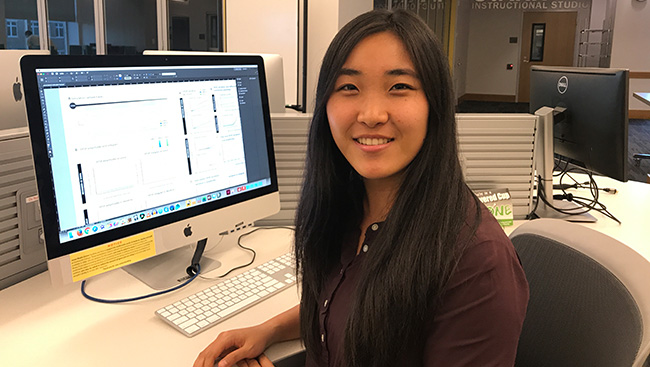
The prestigious Barry M. Goldwater Scholarship is awarded to undergraduate sophomores and juniors planning on research careers in natural sciences, mathematics, or engineering. SfN is proud some of its members are Goldwater Scholarship Award Winners. In this series, we feature three SfN members who are 2017 winners to showcase their accomplishments and offer other undergraduate members interested in conducting research a chance to learn from their experiences. Here, Chenguang Li of Dartmouth College shares her insights.
When did you decide to pursue neuroscience for your undergraduate studies? What led you to making that decision?
I’ve wanted to study the brain since taking an Intro to Neuroscience course at Dartmouth College as a freshman during the fall and joining the Gulledge Lab later that year.
I decided to do a major in physics modified with biology because the neuroscience questions that I’m interested in concern the mathematical and physical properties of neural networks. I want to understand how neurons connect to create circuitry that is the basis for higher-order processes in the brain, and I find the way physicists approach studying large systems a compelling way to look at neural networks.
However, it took a long time for me to decide whether I wanted to pursue a PhD or an MD. Before deciding on a PhD, I received advice from the people around me and read a lot of books by scientists and physicians.
What does your research focus on? What are your responsibilities, and in what lab do you do this research? Why does this research excite you?
My current research project in the Gulledge Lab is a computational study of glutamate receptors in single neurons. I code or modify neuron models, write and run simulations, analyze the data, and put together the results. I’m fortunate that the project is fairly independent and I’m able to see the project through from start to finish, which can be an exciting process. I also like the modeling itself, including thinking about what makes a highly simplified model faithful to reality in the aspects we’re studying.
Besides the Goldwater Scholarship, do you have other scholarships or fellowships to conduct this research?
I have received funding through Dartmouth programs aimed at undergraduates, specifically, through the Sophomore Research Scholars program and the Presidential Scholars program, as well as the Neukom Institute for travel costs and presenting and conducting my research. Information on these programs came from the school’s websites, emails, or posters around campus.
How do you balance time in the lab with all of your classes and any extracurricular activities that you do?
Balancing research, courses, and extracurriculars is a challenge. It’s sometimes not realistic to want to get the most out of my classes, spend a lot of time with friends, and make steady progress on research projects simultaneously. Sometimes I feel as though I have it all balanced well by prioritizing activities and being careful with my time, but often I don’t.
What is one challenge you’ve encountered trying to achieve this balance, and what is your approach to being as productive for and present in all of your school commitments?
As a student, classes tend to be my primary concern, so I sometimes feel as though I’m not working on research as much as I would like. My attempt to solve this is to set aside time as early in the day as I can for research so it doesn’t get pushed aside by my other commitments. I try to figure out what is most important to me and schedule around that.
What is one piece of advice that you would offer other undergraduates who are thinking about or who are already doing lab research to help them be successful?
Reading books written by or about people in science has been extremely valuable. E.O. Wilson and Ramón y Cajal each have a book of advice (Letters to a Young Scientist and Advice for a Young Investigator, respectively) for potential researchers, and many people have written about their experiences in their fields, such as Oliver Sacks in his autobiography, On the Move: A Life, or reflections on their discoveries, like Francis Crick in What Mad Pursuit: A Personal View of Scientific Discovery. Personal recollections like these have given me some perspective on both the life of a scientist and the science itself.
Also read An Undergraduate Research Story: Part One and An Undergraduate Research Story: Part Two.
Speaker






